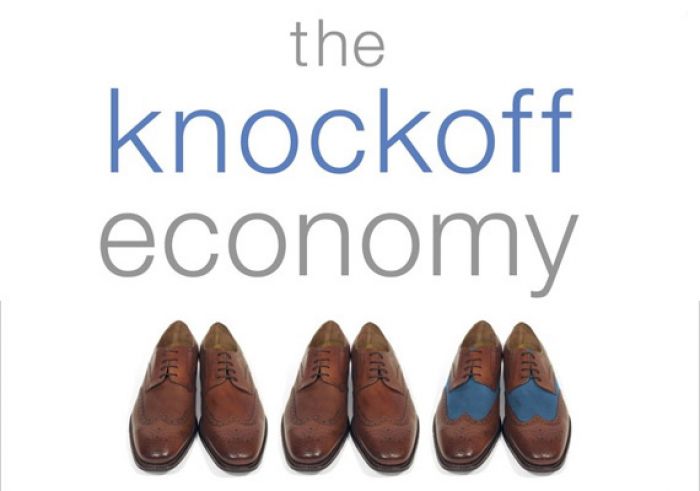
Photo Courtesy of Oxford University Press
We generally hear about knockoffs in the form of counterfeit luxury goods or fast fashion versions of couture clothes but in every industry from restaurants to sports, success breeds imitation. That isn't necessarily a bad thing according to Kal Raustiala and John Springman, the authors of The Knockoff Economy: How Imitation Sparks Innovation.
The authors analyze a variety of industries to see how they handle copyright issues and find that copying doesn't always eliminate creativity; in many cases it sparks it. Copyright protection does not protect fashion design. Design, it seems, exists in a legal gray area. Because it is not great art, designed objects that are deemed "useful articles" can be freely copied.

Fashion designers including Diane von Furstenberg have struggled to change this but it isn't entirely clear if the design industry overall has been hurt by the current state of affairs. Shameless knockoffs flourish and although there have been a flurry of lawsuits including the recent one involving Gucci versus Guess, the copying continues. Counterfeiting is viewed more harshly but even this has a side effect of supporting the brands that are exploited. In fashion, the authors say, counterfeits can even serve as a form of "gateway drug" prompting people to be more likely to buy the real thing.
In the world of food, there are many signature dishes, from Momofuku's Crack Pie to Thomas Keller's Oysters and Pearls, but not a copyright to be found. In this industry, the ability to copy seems to spur creativity more than hamper it as the proliferation of a dish can actually drive people back to the source to experience the original. As is also true in music, the performance (in this case the ambiance of the restaurant and the experience of eating the dish in the place it originated) becomes more important than the product. (Photo courtesy of Diane von Furstenberg)

Often the culture of a particular industry can lead to internal protections. In the worlds of comedy and magic, performers enforce internal codes of conduct to keep material safe. A similar ethos is at work in jamband culture where fans who share music also police against illegal filesharing.
While there is an advantage for being first, the authors show that in some ways, the "tweakers," those who build on another's initial success, might come out even better in the long run. This plays out across a number of fields from football coaching to computer hacking. The open source method doesn't just apply to computing platforms, increasingly it seems that this is the way we grow and innovate. (Photo courtesy of Thomas Keller)

Years ago it would have seemed unlikely that an online encyclopedia put out by a major software giant would lose ground to a ragtag group of free updated pages and yet here we are—Microsoft's Encarta is an Internet memory while Wikipedia lives on and thrives in a state of continuous change. In the ongoing mobile technology race companies build on each other's accomplishments to achieve gains faster than they might alone.
Luxury brands have always been particularly vulnerable to copying and have often gone to great pains to prove they are original. What this book shows is that the counterfeits in many ways actually make brands stronger. Intuitively we may react against the idea that a copy is anything but an insult to the brand but a copy might just be the most potent form of advertising. Learn more at TheKnockoffEconomy.com.









